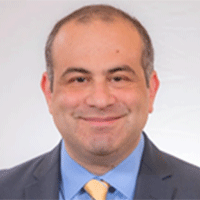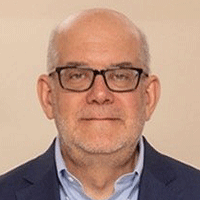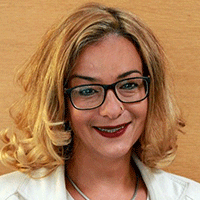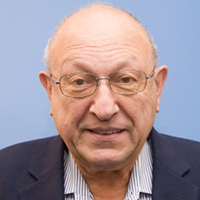
AI, ML and Industry Trends
Presenter/Instructor:
Dr. Amr S. Helmy
University of Toronto
Dr. Amr S. Helmy is a professor in the department of electrical and computer engineering at the University of Toronto. Prior to his academic career, Amr held a position at Agilent Technologies - UK, between 2000 and 2004. At Agilent his responsibilities included developing lasers and monolithically integrated optoelectronic circuits. He received his Ph.D. and M.Sc. from the University of Glasgow with a focus on photonic integration technologies, in 1999 and 1995 respectively. His research interests include photonic device physics, with emphasis on plasmonic nanostructures, nonlinear and quantum photonics addressing applications in information processing / sensing, and data communications. Amr is an active volunteer and leader of the IEEE Photonics Society, currently serving as an Elected Member of the Society’s Board of Governors and as a Distinguished Lecturer. He was also the recipient of the Society’s 2019 Distinguished Service Award.

Additive and Alternative Manufacturing for Electronics
Presenter/Instructor:
Dr. Mark D. Poliks
Binghamton University
Mark D. Poliks is a SUNY Distinguished Professor and Empire Innovation Professor of Materials Science and Engineering and Systems Science and Industrial Engineering at the Thomas J. Watson College of Engineering and Applied Science, Binghamton University, State University of New York. He is the founding director of the Center for Advanced Microelectronics Manufacturing (CAMM), a New York State Center of Advanced Technology and home to the New York Node of the federally supported NextFlex Manufacturing USA. Poliks has made sustained contributions to the fields of materials processing, electronics packaging, flexible, hybrid and additive electronics that are relevant to a variety of medical and industrial applications. Poliks was the General Chair of the 69th IEEE Electronic Components and Technology Conference (ECTC). He is a Fellow of NextFlex, an elected member of the IEEE Electronics Packaging Society (EPS) Board of Governors, serves as the director of student programs and is an IEEE Distinguished Lecturer.

Machine Learning / Liquid Cooling
Presenter/Instructor:
Dr. Remco van Erp
Corintis
Dr. Remco van Erp is co-founder and CEO of Corintis, a Swiss-based company that develops liquid cooling solutions for data center applications. Remco received B.S. and M.S. degrees in mechanical engineering from the Eindhoven University of Technology, Eindhoven, The Netherlands and holds a Ph.D. in microsystems and microelectronics with the École Polytechnique Fédérale de Lausanne (EPFL), Lausanne, Switzerland.

Energy Efficiency and Sustainable Technologies
Presenter/Instructor:
Dr. Amy Marconnet
Purdue University
Amy Marconnet is a professor of Mechanical Engineering and professor of Materials Engineering (by Courtesy), as well as a Perry Academic Excellence Scholar, at Purdue University. She received a B.S. in Mechanical Engineering from the University of Wisconsin – Madison in 2007, and an M.S. and a PhD in Mechanical Engineering at Stanford University in 2009 and 2012, respectively. Her dissertation focused on thermal phenomena in nanostructured materials. She then worked briefly as a postdoctoral associate at the Massachusetts Institute of Technology, before joining the faculty at Purdue University in August 2013. Her work has won outstanding paper awards at ITherm 2012, InterPACK 2017, ITherm 2019, ITherm 2023, and ITherm 2024. In 2017, she won the Woman in Engineering Award from the ASME Electronics & Photonics Packaging Division (EPPD). In 2020, she won the Bergles-Rohsenow Young Investigator Award in Heat Transfer and the Outstanding Graduate Student Mentor from the Official Mechanical Engineering Graduate Association (OMEGA) and the College of Engineering. She won a Humboldt Fellowship for Experienced Researchers and conducted research at Karlsruhe Institute of Technology in the 2021-22 academic year.

Efficient Thermo-Mechanical Simulations Using Compact Models
Presenter/Instructor:
Prof. Dr.-Ing. Tamara Bechtold
Jade University of Applied Sciences
Abstract: Heat is generated in almost all technical processes. For example, the integration density in modern electronic systems is so high that their performance is limited by cooling. Microelectronic reliability depends on thermo-mechanical properties of packages. Highly integrated batteries of hybrid electrical vehicles depend on cooling. The properties of electrical machines are determined by the heat losses, etc. These effects can be determined by numerical simulations via e.g., finite element analysis of thermal or thermomechanical fields. However, the key to correctly considering the entire system is a system-level simulation in which compact models are connected to further mechanical, electrical or fluidic components. Furthermore, the compact models can be used for efficient design optimization and control and can be shared along the supply chain, as they protect the IP.
Using industry-relevant examples, this seminar shows the great advantages of compact models, explains the underlying theory in a comprehensive way and presents the state-of-the-art software tool "Model Reduction inside Ansys".
Biography: Tamara Bechtold obtained her PhD in microsystem simulation from the University of Freiburg, Germany, in 2005. Between 2006 and 2010, she worked as a research engineer for Philips Research Laboratories and NXP Semiconductors in Eindhoven, The Netherlands. From 2011 to 2014 she acted as an interim Professor for microsystems simulation at the University of Freiburg, Germany and since 2014 as a lecturer and research group leader at the University of Rostock, Germany. Since 2017 Dr. Bechtold is a full professor for mechatronic systems at Jade University in Wilhelmshaven, Germany. Since 2022 she is a managing director of Steinbeis Transfer Center. Dr.Bechtold is author or co-author of over 150 technical publications in the area of modelling and simulation of micro-mechatronic systems.

Analytical ("Mathematical") Modeling in Reliability Physics Problems in Microelectronics and Photonics Engineering: Perspective
Presenter/Instructor:
Ephraim Suhir, Ph.D.
Bell Labs, Physical Sciences and Engineering Research Div., Murray Hill, NJ, USA (ret);
Portland State University, Depts. of Mech.and Mat., and Elect. and Comp. Engng., USA.
University of California-Los Angeles (UCLA), Risk Analysis Institute, USA
Dr. Suhir is IEEE, ASME, SPIE and IMAPS Life Fellow, APS, IoP(UK) and SPE Fellow, and AIAA Associate Fellow. He received numerous professional awards. Particularly, he is the third Russian American Scientist, after S. Timoshenko and I. Sikorsky, who received the prestigious ASME Worcester Reed Warner Medal for outstanding contribution to the permanent literature of engineering (and establishing a new discipline – structural analysis of electronic and photonic systems). Ephraim authored and co-authored 500+ publications and enjoys numerous references to his published work.